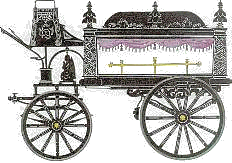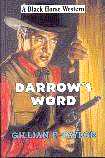


It might have been Christmas in Wyoming but there was certainly no good cheer for Sheriff Darrow for he had a cold-blooded murder to contend with. Worse still, it looked as if the charming Beatrix Verstappen could be the guilty party. Certainly she was the only witness so Darrow slammed her into jail. But that didn't go down well with the menfolk in town and even Darrow's deputy was dismayed.
However, Beatrix's brother, Henk, was the real problem for he had vowed to free her whatever action he had to take, and, as blizzards isolated the little town, he made his desperate plans. The sheriff had only his cowardly deputy and the town undertaker to help, so the situation was grim indeed.
Nevertheless, Darrow had given his word to solve the murder and , by God, nobody would make him break it !
I thoroughly enjoyed writing Darrow's Law and felt there was still plenty of milage in the
characters of Sheriff Beauchief Darrow and his Deputy, Hugh Keating. After all, the characters they were inspired by (Avon and Vila from
Blakes 7) appeared in 51 and 52 episodes of the TV series respectively, and they were still developing when the series ended.
(The origin of Darrow and Keating and their relationship to the sci-fi originals is discussed on the page about
Darrow's Law). So with two good characters and a fully designed town for them to live in, there was plenty of opportunity for new
adventures
After watching the excellent film Rio Bravo again, I decided to use the basic plot idea of a sheriff trying to keep hold of
a prisoner while the prisoner's friends try to rescue them. The same idea is used to different effect in 3.10 to Yuma,
where a honest but poor farmer keeps guard over an outlaw until the train arrives to take the prisoner to jail. I needed a reason why the
prisoner was staying in Darrow's care instead of being shipped straight to Laramie on the train. I remembered the description of how a
prairie town could be isolated in Laura Ingalls Wilder's book The Long Winter and used that as a basis for the endless blizzards
that cut off Govan, Darrow's town.

Although the principal villain in the first Darrow book was a woman, I decided to create another female villain in spite of the possibility
of repeating situations. In the end, the two woman, although both beautiful, were different characters and so the interaction was
different. Beatrix Verstappen was inspired by the kind of attention-seeking woman who likes to have a string of men half in love with her.
I decided to make her of Dutch origin, for no good reason except that I hadn't created a Dutch character before. Both Beatrix and her mother,
Wilhelmina, were named for Dutch queens, while her brother's name, Henk, came from one of the people who helped Anne Frank and her family in
the Second World War. The name Henk was introduced to America by the Dutch and subsequently became corrupted to Hank. The family surname,
Verstappen, happens to be the name of a racing driver and just sounds cool. I asked a friend, Krissy, who had lived in Holland for
information on the Dutch accent when speaking English. I'm not sure Wilhelmina's accent as written is quite right but it was the best i
could manage.
I've seen the effect that attention-seekers like Beatrix have on men, and it was rather fun to write about one and show just how selfish
they can be. A lot of men are flattered by the attention of such charming women, as Hugh Keating is by Beatrix, and give their attention
and loyalty in return. However, some men see through this approach and Darrow is
exactly the sort to put Beatrix in her place. In fact it turned into an entertaining battle of wills between the spoilt, stubborn woman and
the cool, determined sheriff.
She smiled up at the Sheriff as he spproached her. "You said the blizzard would end today and it has. You were right."
"I usually am." Darrow took her arm and started leading her to the stairs.
"Where are you going ?" Beatrix exclaimed, hanging back.
"The storm's over; you're going back to your cell." Darrow's voice was implacable.
"No ! Oh, please, Sheriff," Beatrix added more moderately. "it's so lonely and dull down there and I've been trying so hard to be nice to you." She clung to his arm and peered anxiously up at him, a frail doll-woman.
"I know." Darrow smiled wolfishly.
The sweetness vanished in a moment. "Why, you've been fooling me all along !" Beatrix exclaimed.
"You were trying to fool me," Darrow said reasonably.
Darrow's Law introduced the character of Minnie Davis, the plain but nice young woman that Hugh is attracted to. She reappeared in Darrow's Word at first simply to keep continuity, with her friendship with Hugh having developed into steady courting. As I wrote more, Minnie became an active contrast to the lovely but selfish Beatrix. Minnie cooks good food for Hugh and Darrow; Beatrix demands to be waited on and can't even make good coffee. Minnie is sympathetic to Hugh after his friend's death; Beatrix entirely forgets that Hugh was a friend of the man she shot. As the climax of the novel, the two women come face to face, openly on opposite sides.
"Aren't you the lucky one, being rescued by your English gentleman ?" Beatrix sneered.
Minnie answered honestly. "Hugh is doing his duty, as is Sheriff Darrow".
The unashamed answer prodded at Beatrix's conscience, such as it was. Minnie Davis wasn't pretty or fascinating but the lawmen were willing to give up their prisoner for her sake, and no one would ever spread nasty rumours about Minnie's behaviour. That knowledge made Beatrix snappy.
It is to Hugh's credit that he realizes which of the two is the better person in spite of being a soft touch for a pretty face.

A new character introduced in this story is Josh Turnage, the town undertaker. He is the character played by my friend, Phil, in a Deadlands
roleplaying campaign that I ran. Phil also played in the one-off scenario that became Cullen's Quest.
Deadlands is a gothic horror western setting, and Phil announced that he wanted to play an undertaker whose clients got up and walked
out on him. I felt that I couldn't really use zombies in a traditional western setting (although it has been done by J T Edson !). I did
outline a story where someone spreads rumours of ghosts and ghouls to keep people away from his gold mine, but that rapidly turned into a
Scooby-Doo story ("I'd have gotten away with it too, if it weren't for you interfering lawmen !"). It might well make a fun scenario but I
couldn't see my publishers liking it.
Turnage suited the setting of the Darrow books better than the other characters from the roleplaying game so I got Phil's permission to add
him to the book. He was only intended to make a brief appearance at first, and to help out Darrow when Hugh is hurt, but he kept writing
himself into the story again. Turnage also developed a decidedly black sense of humour:
Darrow spoke quietly to him. "Before you embalm the body I want Doc Travis to take a look. I would like to know what size of bullet it was."
"Of course." Turnage was a lean man, often unnervingly intense and sometimes unnervingly outgoing. "There's no hurry," he said. "They don't go off so fast in this weather."
I'm not saying how much of Turnage's humour was inspired by Phil, but Phil did give me 'The Perverse Person's ABC' as a birthday gift.
A characteristic I kept from the game character was Turnage's ability to be unnerving. The game character was defined as a
'Creepy Undertaker'. In the book, I described Turnage as gazing at people as though measuring them for their coffin. It generally has the
effect of making them remember business elsewhere. Turnage became such fun, and so useful, that he will probably return in another book.
As with San Felipe Guns, I decided to turn the weather into an element of the story. In this case, a series of blizzards isolates the town and serves the plot purpose of keeping Beatrix Verstappen in the local jail, where her brother can make rescue attempts. In fact the settings in Darrow's Word are almost entirely indoors, giving it a claustrophobic feel which reflects the way the town's inhabitants are kept inside by the blizzards. The town is isolated from the rest of the world and houses even become isolated from one another while the storms rage. The storms also contributed to another story element; the food shortages. Having set the story right after Christmas, I could have the stores low on supplies anyway, what with all the baking and other preparations for the holidays. The subsequent shortages as the town's supplies run low gave the sheriff something else to worry about. It also added some straightforward action drama, with the lawmen having to cope with hungry people fighting over food and a mob forming outside the grocer's. These scenes with the townspeople gave me a chance to show the world around the good guys and the bad guys, putting them in the context of their environment and paying tribute to the vast majority of pioneers of the West. Few pioneers were lawmen or criminals but they endured all the hardships of extreme weather, hunger and cold. It was good to reintroduce some of the named characters from the first book to give a sense of continuity in the little town of Govan.
As with Darrow's Law, the publishers had mixed feelings about Hugh as a central character. They said that they enjoyed the novel
and wanted to publish it while simultaneously expressing reservations about Hugh and about the humour. I'd actually tried to make Hugh look
a little more heroic while remaining true to the character. The endless blizzards don't give him much opportunity for drinking or gambling
anyway. I also made the point that while scared of fights and rather cowardly, Hugh will try to do his duty even though it puts him at risk.
Darrow's Word was published at the end of April 2001, my seventh original book in print. The title is the one I chose, although I
spent some time trying to decide exactly what I wanted. I considered variations such as 'Darrow's Promise', but decided that sounded too much like
a Mills and Boon romantic novel. The blurb on the back is pretty much what I wrote, but somewhat longer than the word allowance I was given.
The cover is a very vivid image, especially when you are faced with six of them at 7:20 in the morning, which is when my copies were
delivered. It's a nice, generic Western image which doesn't really fit anything in the book but then isn't obviously wrong either. What
it does suggest, however, is that the cover artist had been watching High Noon recently.

Still, if you are going to steal, steal from the best. It seems to work for me.
Back to Black Horse Western page
Back to my home page